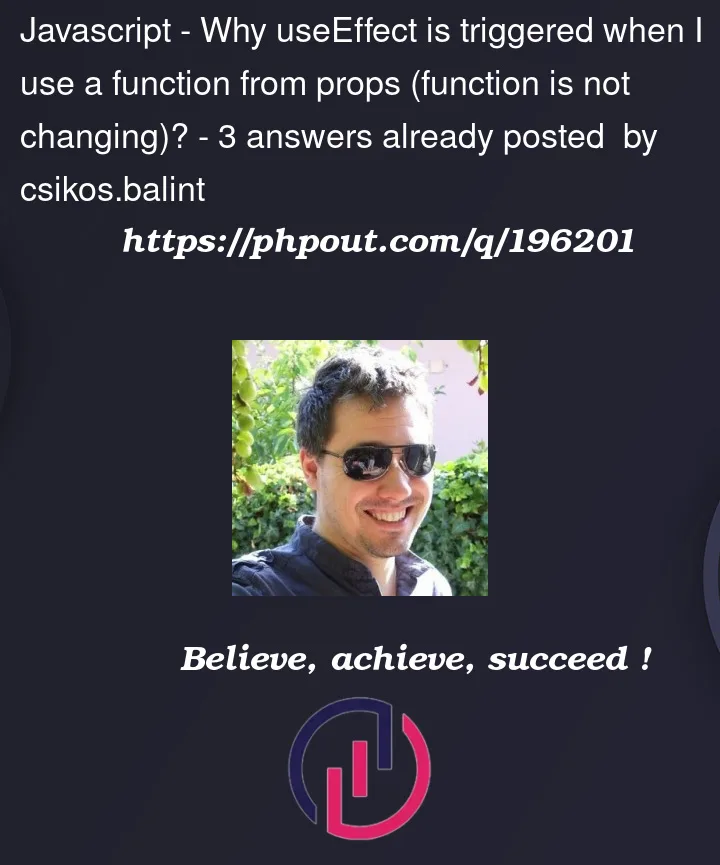The Main component is calling a Modal/Dialog.
[...]
const closeDialog = () => setIsOpenDialog(false);
return (
<MyDialog
isOpen={isOpenDialog}
onClose={closeDialog}
/>
);
The MyDialog code is:
[...]
useEffect(() => {
console.log('This removes dialog states (data)!')
}, [onClose]);
export default function MyDialog({
isOpen,
onClose,
}) {
return (
<Dialog
isOpen={isOpen}
onClose={onClose}
dialogTitle="Add/Edit"
onClickCancel={onClose}
>
[...]
</Dialog>
);
}
When I click on Cancel and call onClose, I can see that the useEffect is triggered. I would like to ask what is the reason? My understanding is that it shouldn’t since the onClose function object (from props) does not change.




3
Answers
The
useEffecthook in React runs when any of the dependencies in its dependency array change. In your case, theuseEffecthas a dependency on theonCloseprop. Therefore, it would run every time theonCloseprop changes.However, even though the
onClosefunction doesn’t change in your code,useEffectmight still run due to the way JavaScript handles function identities. In JavaScript, every time you define a function, it’s a new instance, even if it does exactly the same thing.So, in your case, you’re defining
closeDialogas a new function in your render function every time your component re-renders. That means, from React’s perspective,onCloseis a new function every time, which triggers theuseEffect.To solve this, you can use the
useCallbackhook to ensure yourcloseDialogfunction has a stable identity across renders unless its dependencies change:In the example above,
useCallbackreturns a memoized version of the function that only changes if one of the dependencies has changed. In this case, the dependencies array is empty ([]), meaning the identity of thecloseDialogfunction will be stable across re-renders.The
useEffecthook in theMyDialogcomponent is triggered because the dependency arrayonCloseis specified. This means that the effect will run whenever the value ofonClosechanges. Though the function reference foronCloseremains the same throughout the lifecycle of theMyDialogcomponent, the effect is not comparing the function reference itself, it’s comparing the value ofonClosein each render cycle. WhenonClosefunction is invoked,MyDialogcomponent is rendered again, and then a new instance ofonClosefunction is created. This causes the value ofonCloseto change which triggers theuseEffecthook.In javascript, this term is known as referential equality.
Example:
First render
So when react re-renders the component it re-declares this function
Second render
So if a useEffect has function1 as a dependency it will compare the declaration in the Second Sender with the declaration in the First Render.
So it will result in
111 !== 112Then depending on this condition it will re-run the useEffect.
To solve this issue:
For functions: you can use the
useCallbackhookFor objects and arrays you can use
useMemohook